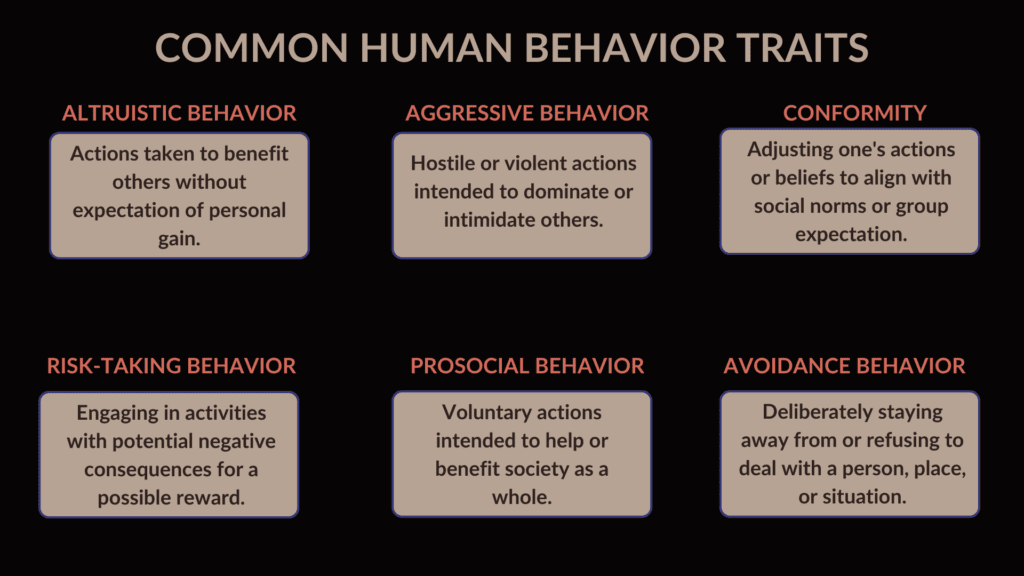Unlocking the Mysteries of the Mind
The human brain is a complex and fascinating organ, constantly shaping our thoughts, emotions, and actions in ways we are only beginning to understand. As a neuroscience-based life coach, I have always been captivated by the profound insights that neuroscience offers into the human experience. By uncovering the neural mechanisms underlying our choices and decisions, neuroscience is revolutionizing human behavior studies and our understanding of human behavior, opening up new avenues for personal growth and societal progress.
What is Human Behavior?
Human behavior encompasses the full range of actions, reactions, and interactions exhibited by individuals in response to internal and external stimuli. It is a complex interplay of biological, psychological, and social factors that shape how we think, feel, and act in various situations.
At its core, human behavior includes:
- Cognitive processes: How we perceive, think, reason, and make decisions.
- Emotional responses: Our feelings and how we express them.
- Social interactions: How we communicate and relate to others.
- Physical actions: Our observable movements and reactions.
- Habits and routines: Repetitive behaviors that become automatic over time.
Comprehension of human behavior is crucial for various fields, including psychology, sociology, anthropology, and neuroscience. It helps us comprehend why people act the way they do, predict future actions, and develop strategies for positive change.
Factors influencing human behavior include:
- Genetic predispositions
- Brain structure and function
- Personal experiences and learning
- Cultural and societal norms
- Environmental conditions
By studying human behavior, we can gain valuable insights into the human mind, improve interpersonal relationships, and develop more effective approaches to education, mental health treatment, and social policy.

Evolution of Human Behavior
Human behavior, as we know it today, is the result of millions of years of evolutionary processes. Our ancestral history has shaped our cognitive abilities, emotional responses, and social interactions, adapting us to survive and thrive in diverse environments.
Key aspect include:
- Social cooperation: Humans evolved to be highly social creatures. Our ability to cooperate in large groups, share resources, and communicate complex ideas gave us a significant survival advantage.
- Cognitive development: The expansion of the human brain, particularly the prefrontal cortex, allowed for more sophisticated problem-solving, planning, and abstract thinking.
- Language development: The evolution of complex language systems enabled more efficient information sharing and cultural transmission.
- Emotional complexity: Our emotions evolved as rapid response systems to environmental challenges, facilitating quick decision-making and social bonding.
- Tool use and technological innovation: The ability to create and use tools set humans apart from other species, allowing us to modify our environment and extend our physical capabilities.
- Adaptability: Humans developed the capacity to adapt to a wide range of environments, from tropical forests to arctic tundras, through both biological and cultural evolution.
- Mate selection and parenting: Complex mating behaviors and extended childcare periods emerged, contributing to the transmission of both genetic and cultural information.
Understanding the evolutionary roots of social interactions provides valuable insights into why we act the way we do. It helps explain many of our instincts, biases, and social structures. However, it’s important to note that while our evolutionary history influences our behavior, it doesn’t deterministically control it. Human culture, individual experiences, and our capacity for rational thought all play significant roles in shaping our actions.
By studying the evolution of personal patterns, we can better understand our predispositions and develop strategies to align our evolved tendencies with the demands of modern society, promoting both individual well-being and societal progress.
The Neural Basis of Decision-Making
One of the most significant contributions of neuroscience to grasping human behavior is in the realm of decision-making. Research has shown that our choices are not purely rational or conscious, but are heavily influenced by emotional and unconscious processes in the brain. The amygdala, a small almond-shaped structure deep within the brain, plays a crucial role in processing emotions and triggering the fight-or-flight response. This emotional processing can often override the more rational and deliberative functions of the prefrontal cortex, leading to impulsive or suboptimal decisions.
However, neuroscience has also revealed that we can train our brains to make better decisions by strengthening the connections between the prefrontal cortex and the limbic system, which includes the amygdala. Techniques such as mindfulness meditation and cognitive behavioral therapy have been shown to enhance emotional regulation and improve decision-making by allowing us to step back from our immediate emotional responses and engage in more reflective and goal-directed thinking.

The Neuroscience of Habit Formation
Another key insight from neuroscience is the role of habit formation in shaping people’s actions. Our brains are remarkably efficient at automating routine behaviors, allowing us to conserve mental energy for more demanding tasks. This automation is mediated by the basal ganglia, a group of subcortical structures that play a key role in reward processing and motor control.
When we engage in an action repeatedly, the basal ganglia create strong neural connections that make the behavior more automatic and effortless over time. This is why habits can be so difficult to break â they are literally wired into our brains. However, neuroscience has also shown that we can rewire our brains and create new habits by consistently engaging in desired behaviors and rewarding ourselves for doing so. By understanding the neural basis of habit formation, we can develop more effective strategies for human behavior and personal growth.
The Social Brain
Neuroscience has also shed light on the deeply social nature of the human brain. Research has shown that our brains are exquisitely attuned to social cues and interactions, with dedicated neural circuits for processing faces, emotions, and social hierarchies. The mirror neuron system, for example, allows us to empathize with others by simulating their actions and emotions in our own brains.
This social wiring of the brain has profound implications for understanding human behavior in a social environment. It helps explain why we are so strongly influenced by our social contexts and why social support is so crucial for mental health and well-being. By understanding the neural basis of social cognition and human behavior in social environments, we can develop more effective interventions for individuals struggling with social difficulties, such as those with autism spectrum disorders or social anxiety.“
The Plastic Brain
Perhaps the most exciting insight from neuroscience is the remarkable plasticity of the brain. Contrary to the long-held belief that the brain is fixed and unchangeable after early childhood, neuroscience has shown that the brain remains adaptable and malleable throughout life. This plasticity is the key to learning, memory, and personal growth and is referred to as “neuroplasticity“.
By engaging in new experiences, taking on challenges, and practicing skills, we can literally rewire our brains and strengthen the neural connections that supportdesired human behaviors and cognitive abilities. This knowledge has profound implications for education, rehabilitation, individual conduct and personal development. It suggests that we are not limited by our current abilities or circumstances, but have the power to shape our own brains and lives through intentional effort and engagement.

Harnessing the Power of Neuroscience for Personal Transformation
The neuroscience of human behavior is a rapidly evolving field that offers profound insights into the human experience. By uncovering the neural mechanisms underlying our thoughts, emotions, and actions, neuroscience is revolutionizing our understanding of ourselves and others. This knowledge has the power to transform not only individual lives, but also society as a whole, by informing more effective approaches to education, mental health, and social policy.
As a neuroscience-based life coach, I am passionate about translating these insights into practical strategies for personal growth and well-being. By understanding the brain, we can harness its incredible potential for change and cultivate the mindsets and behaviors that allow us to thrive. The journey of self-discovery and transformation is never-ending, but with the tools of neuroscience at our disposal, we are better equipped than ever to navigate the complexities of the human experience and create the lives we desire.
From My Chair: The Importance of Emotional Intelligence
Having founded my practice over two decades ago, I’ve observed firsthand the profound impact of emotional intelligence (EI) on individual conduct and interpersonal dynamics. EI, the ability to recognize, understand, and manage our own emotions while empathizing with others, is a cornerstone of effective social interaction and personal growth.
In my experience, individuals with high emotional intelligence tend to:
- Navigate complex social situations with greater ease
- Build stronger, more meaningful relationships
- Demonstrate enhanced leadership capabilities
- Show improved resilience in the face of challenges
- Make more balanced and thoughtful decisions
The beauty of emotional intelligence lies in its malleability. Unlike IQ, which remains relatively stable throughout life, EI can be developed and honed through conscious effort and practice. This presents an exciting opportunity for personal growth and behavioral change.
I believe that cultivating emotional intelligence is crucial for understanding not just our own actions, but also the motivations and feelings of those around us. It allows us to respond to situations more adaptively, rather than reacting impulsively based on immediate emotional responses.
Moreover, in our increasingly interconnected world, the ability to empathize and communicate effectively across diverse cultures and perspectives is more important than ever. Emotional intelligence serves as a bridge, fostering understanding and cooperation in both personal and professional spheres.
As we continue to unravel the complexities of the human mind through neuroscience, the significance of emotional intelligence in shaping our interactions and decisions becomes increasingly clear. By focusing on developing this crucial skill set, we can not only improve our own lives but also contribute to creating more harmonious and productive social environments.













